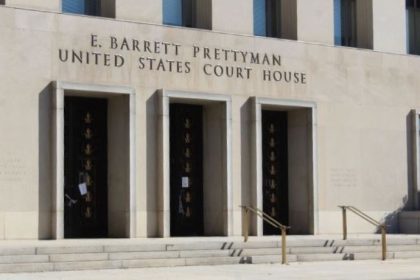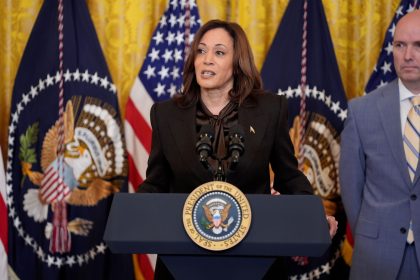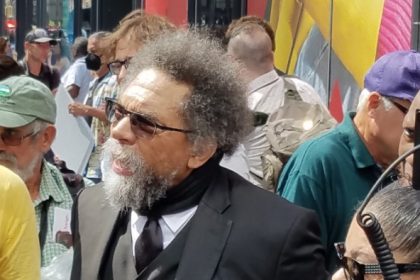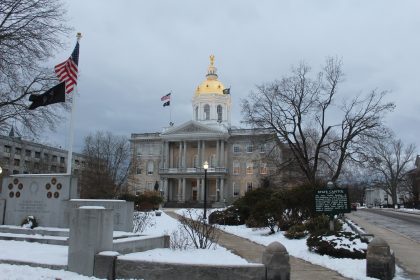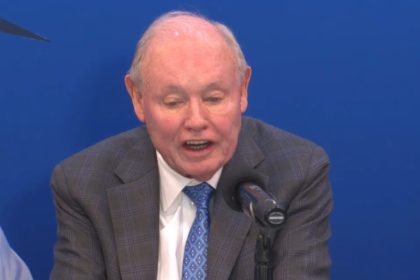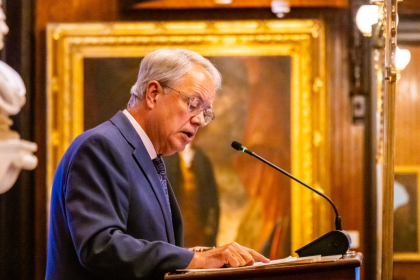Florida’s Secretary of State Sued Over ‘Vague’ Voter Registration Form
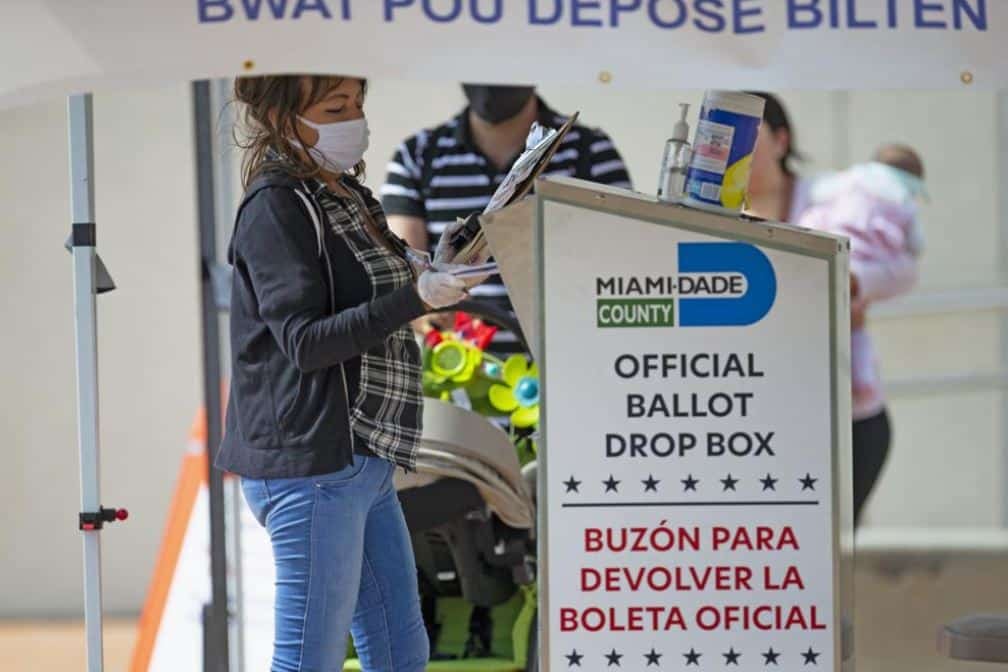
TALLAHASSEE, Fla. — The state chapters of the League of Women Voters and the NAACP are suing Florida Secretary of State Cord Byrd over what they contend is an intentionally vague voter registration form that violates federal law.
According to the organizations’ complaint, the application fails to meet the basic minimum standards set forth in the National Voter Registration Act for informing potential voters about Florida’s complicated eligibility requirements.
And this is particularly true when it comes to individuals with felony convictions.
Florida’s voter registration application, which has been in use since 2012, asks potential voters to affirm either that they are not a convicted felon or that they are, but have had their right to vote restored.
The problem is, in 2018 Florida voters overwhelmingly passed Amendment 4, which automatically restored the voting rights of most felons.
The application currently being used in elections across the state does not specify that the majority of convicted felons now have their voting and other citizenship rights restored automatically upon the completion of all terms of their sentence.
Nor does it state, the plaintiffs say, any notice that citizens convicted of murder or felony sex offenses can only have their rights restored through the clemency process.
In short, the plaintiff organizations say, “Florida enacted a byzantine statutory scheme for the restoration of voting rights following felony convictions that made it ‘sometimes hard, sometimes impossible’ for returning citizens (Floridians with past felony convictions) to determine their eligibility to vote.
“Over the last five years,” the complaint continues, “Florida changed its voter eligibility rules for returning citizens significantly. But the application … does not account for these changes.”
The passage of Florida’s Amendment 4 was the largest single expansion of voting rights since the U.S. Constitution was amended in 1971 to lower the legal voting age to 18. In all, about 1.4 million Floridians with non-disqualifying felony convictions expected to regain their right to vote due to the historic ballot initiative.
Then, in 2019, Florida enacted Senate Bill 7066, which critics said created a pay-to-vote system in the state.
What SB 7066 required was that convicted felons complete “all terms of sentence,” specifying for the first time that this included full payment of restitution, or any fines, fees or costs resulting from the conviction, before they could regain the right to vote.
According to the plaintiffs in the current case, the new law “effectively revoked the eligibility of nearly half of the intended beneficiaries of Amendment 4 — more than 774,000 returning citizens who owe certain court-imposed debts that they cannot afford to pay.”
In short order, a number of lawsuits were filed challenging SB 7066, in which plaintiffs argued that requiring them to pay fines and fees before they would be eligible to vote again was unconstitutional.
In May 2020, U.S. District Judge Robert Hinkle ruled that Florida could prohibit felons from voting if they have outstanding legal financial obligations (court fees, restitution, fines) that they are able to pay, but that the state cannot prohibit a person from voting if they have outstanding legal financial obligations that they are unable to pay.
That September, the 11th U.S. Circuit Court of Appeals ruled in Jones v. DeSantis that the state of Florida can require former felons to pay all fines and fees before regaining the right to vote.
In a passage of the ruling that could have ramifications for the outcome of the current case, the 11th Circuit said, “The felons complain that it is sometimes difficult to ascertain the facts that determine eligibility to vote under Amendment 4 and Senate Bill 7066, but this complaint is only another version of the vagueness argument we have already rejected.
“The due process clause does not require states to provide [an] individual process to help citizens learn the facts necessary to comply with laws of general application,” the court said.
The league and the NAACP, however, said the situation arising from the voter registration form could cause serious harm — the complaint refers to “tragic consequences” — in addition to the constitutional arguments.
“Within the last 13 months alone, the state prosecuted at least 39 returning citizens for registering to vote or voting while allegedly ineligible to do so,” the complaint says. “Available evidence reflects that most if not all of these returning citizens honestly believed themselves to be eligible to register and vote.
“For several of these returning citizens, a government official advised them to register or told them they could vote,” the complaint continues, adding, “Most if not all returning citizens that the state prosecuted received an official voter information card in the mail.”
To the plaintiffs, “Florida’s voter information card ‘constitutes notice of approval of registration.’ In other words, the state arrested and prosecuted dozens of returning citizens (most of whom are Black) in the face of objective circumstances that would cause any reasonable person to honestly believe in his or her eligibility to register and vote.
“These returning citizens faced or are facing felony charges, punishable by up to five years in prison and $5,000 in additional court-imposed fines,” they said.
“Florida appears to have adopted a policy of prosecuting returning citizens for good-faith mistakes,” the complaint says. “The state’s application makes matters worse. It increases the risk that a returning citizen will be investigated, prosecuted and re-ensnared in the criminal system.
“Specifically, the application requires applicants to affirm their eligibility without providing them with the information they need to make that determination, or the guidance they require to accurately complete the form,” it says.
The league and NAACP are asking the court to rule the Florida voter application violates the National Voter Registration Act, to enjoin Florida’s secretary of state from using the application, and to order him to develop a new one.
“Our state has a moral and legal duty to inform prospective voters of their eligibility to register,” said Cecile M. Scoon, president of the League of Women Voters of Florida, in a written statement.
“It is imperative that Floridians with past felony convictions understand whether they are eligible to register to vote, particularly when the state is targeting those who misunderstand this with criminal prosecution. The state must fulfill the requirements of the National Voter Registration Act and protect its residents,” she said.
Byrd has asked the court to dismiss the lawsuit, saying Florida’s voter registration application is sufficient.
The lawsuit, filed on May 24, was actually the second suit filed against Byrd by the league in the past month.
The earlier lawsuit, filed in cooperation with the Campaign Legal Center, also names Florida Attorney General Ashley Moody as a defendant.
In the lawsuit the plaintiffs claim that Florida’s recently enacted omnibus election law would restrict and penalize basic nonpartisan civic engagement efforts.
The law, Senate Bill 7050, directly targets and drastically restricts the ability of nonpartisan civic engagement organizations, like the League of Women Voters of Florida, to engage with voters, violating their right to freedom of speech and association, the plaintiffs claim.
“Folks helping their neighbors access and exercise the fundamental freedom to vote is one of the pillars of our democracy,” said Paul Smith, senior vice president at Campaign Legal Center, in a written statement.
“Instead of celebrating civic engagement groups for their work to encourage participation in our democracy, Florida legislators restricted and penalized basic voter outreach efforts,” Smith continued. “This action will directly harm members of historically marginalized communities — including voters of color, low-income voters, voters with disabilities and young voters — who rely on these nonpartisan efforts to help make their voices heard.”
Dan can be reached at [email protected] and @DanMcCue

















